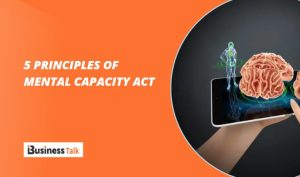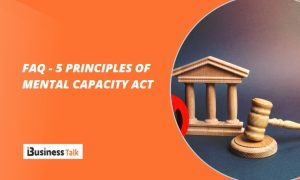
5 Principles of Mental Capacity Act
The Mental Capacity Act 2005 (MCA 2005) mandates that people making medical decisions be of sound mind and understood capacity. The MCA 2005 came into effect in 2009 to promote the individual’s best interests over that of the collective interest. A key aspect of best-interest decision-making is capacity. In this blog, we will look at the 5 principles of the mental capacity act and their application in the decision-making process under the act.
Mental Capacity Act Principles
The Mental Capacity Act says,
- Unless proven otherwise, assume a person may make their own decision.
- Whenever possible, assist individuals in reaching their own choices
- Just because a person makes an unwise choice does not mean they cannot make a choice.
5 Principles of Mental Capacity Act

The Mental Capacity Act has five key principles that must be considered when dealing with people who lack capacity. These principles include the presumption of capacity, the provision of support to make a decision, the recognition of unwise decisions, consideration of best interests and least restrictive measures.
These principles are always assumed in any decision-making process and act as a guide to ensure a person’s rights are protected, and the best possible care is provided.
However, it is also important to remember that mental capacity depends on the decision and the individual’s circumstances. Therefore, it is crucial to consider each case individually and ensure people with the capacity can make informed decisions about their care.
Principle 1: A presumption of capacity

It is assumed that everyone has capacity until proven otherwise. Assuming a person lacks capacity based on their age, appearance, or condition is a dangerous practice that can lead to a lack of care and treatment- the very thing the mental capacity act is designed to prevent. The act places the onus of proving capacity on the person being evaluated.
Under the act, capacity must be presumed in every adult unless there is a reasonable basis to question their mental capacity. A decision must be independent of a person’s previous decisions or assuming they have the capacity when they do not. All adults deserve the right to make decisions free from concerns about their mental capacity.
Principle 1 of the mental capacity act states a presumption of capacity. It requires thoroughly evaluating a person’s mental capacity before deciding on their behalf or authorizing care and services.
Principle 2: Individuals being supported to make their own decisions
The Mental Capacity Act 2005 (MCA) recognizes the rights of individuals to make their own decisions and sets out the principles that should be respected when people have capacity issues. While the act does not explicitly require decision-making support in all capacity-related situations, it provides a general framework for decision-making support as a best practice.
This includes the principle of “Individuals being supported to make their own decisions”, which states that decision-making support must be tailored to the individual’s needs and circumstances. The act also specifies key principles for decision-making support, including providing information that is easy to understand and relevant to the decision.
In mental capacity cases, individuals may lack the capacity to decide independently. This may be due to physical disability, such as dementia or brain injury; mental disability, such as a severe mental illness; or a combination of both. Before deciding that someone cannot make a decision, all practical and appropriate steps must be taken to help them make the decision themselves.
The best way forward is to inform them about relevant options and let them choose according to their interests and preferences.
Principle 3: Unwise decisions

The Mental Capacity Act states that people can make decisions others might regard as unwise or eccentric, regardless of their capacity. It is a legal principle that health and welfare professionals must respect.
An unwise decision cannot be used to determine a lack of capacity; people with capacity must be free to make their own decisions. This principle applies even if the decision seems odd or ill-advised. Health and social care professionals must consider if the individual has the capacity and if they are under pressure to make a decision.
Whether a person has capacity can often depend on the decision in question and its circumstances. Unwise decisions can relate to day-to-day decisions, such as what to wear and life-changing severe decisions, like moving into a care home.
Principle 4: Best interests
The Principle of Best Interests states that the individual’s best interest should be the primary consideration when making mental capacity decisions. This principle is based on autonomy, which states that individuals have a right to make decisions about their lives, free from interference or coercion.
This principle applies when decisions are made for someone lacking mental capacity. When making mental capacity decisions, the individual’s best interest must be at the forefront. In addition, the decision-making process should be designed to ensure the individual’s rights and freedoms are respected and protected.
When making a mental capacity decision, care must be taken to assess the best interest using the Best Interest Checklist in Section 4 of the Mental Health Act 2005. This checklist provides a structured approach for assessing whether a decision is in the best interest of an individual with mental capacity.
Principle 5: Less restrictive option

Health and social care professionals must always consider the least restrictive option when deciding on mental capacity. This principle applies when individuals cannot make decisions for themselves but still need help making choices that affect their welfare. The less restrictive option should be the best way of providing support and care while preserving the individual’s rights and freedoms.
When assessing whether a less restrictive option exists, health and social care professionals should consider all available information about the person concerned. This includes their medical history, condition, preferences, abilities and limitations.
Conclusion
The act’s principles help establish a framework for best-interest decision-making. They serve as the foundations of best-interest decision-making and guide decision-makers in making informed choices based on the person’s best interests. The act also directs decision-makers to consider mental capacity when making decisions and ensures that the person’s wishes are respected and considered.
It also empowers decision-makers to act in the person’s best interest if they cannot reach a decision. Now that you’ve learned these principles, you can use them when supporting someone else’s decision-making process.
FAQ – 5 Principles of Mental Capacity Act

What are the five principles of care?
The principles of care are the five key principles that must be followed when making decisions for someone who cannot make their own. They are:
- Every adult has the right to make their own decisions and must be assumed to have the capacity to do so unless it is proved otherwise.
- People must be supported as much as possible to make their own decisions before anyone concludes they cannot do so.
- There is a presumption of capacity, which means that unless there is a valid reason to believe otherwise, people generally can make sound decisions for themselves.
- Best interests must always be at the heart of decision-making, which means that the wellbeing of the person being decision must always be a top priority.
- Any intervention must be with the least restriction possible to minimize any negative consequences that may come from it.
What are the 4 elements of capacity?
The four main elements of capacity that the Mental Capacity Act of 2005 sets out are:
- The ability to understand and retain information: This includes understanding the information you’re being given, retaining the information for a reasonable period, and using the information for decision-making purposes.
- The ability to weigh up the information and decide: You need to understand the information and weigh the pros and cons of making a decision before acting on it.
- The ability to communicate a decision: You need to clearly and accurately communicate your decision to others, whether they’re family members, caregivers, or medical professionals.
- The ability to comprehend the consequences of the decision: You need to be aware of the potential negative consequences of your decision to make an informed choice.
What are the 10 mental health principles?
The 10 mental health principles are as follows:
- It is presumed that adults can make decisions unless proven otherwise.
- Individuals should be supported to decide for themselves, considering their limitations.
- Unwise decisions should not be assumed to be wrong.
- Decisions should be made in the person’s limited capacity’s best interest.
- Any intervention should be the least restrictive possible.
- Capacity is time and decision specific.
- Every adult has the right to make their own decisions.
- Values should be individualized and weighed according to the person’s situation and values.
- Decisions should only be made by consulting a mental health professional or another individual who can help make an informed decision based on the person’s unique circumstances.
- Recovery from mental health conditions requires time, patience, and support from loved ones
What are the 3 types of capacity?
There are three types of capacity under the Mental Capacity Act (MCA): decision-making, decisional, and mental capacity.
- Decision-making capacity refers to a person’s ability to make life-changing daily decisions. These decisions could include who they want to marry, whether to have surgery or where to live.
- Decisional capacity refers to the ability of a person to make decisions about their care, treatment, or welfare. This includes making medical choices, selecting a doctor or care home, or deciding which course of treatment they want to undergo.
- Mental capacity is ‘decision specific’ and ‘time specific’. This means that a person’s mental capacity may differ depending on the decision and the time of day. For example, someone with decisional capacity might have surgery at 3 pm but not at 9 am the next morning.
Mental capacity is also ‘reversible’. This means a person’s mental capacity can recover if the decision-making capacity is restored.
What are the pillars of capacity?
The five key principles of the Mental Capacity Act 2005 are the presumption of capacity, support to make a decision, ability to make unwise decisions, best interests, and least restrictive intervention.
The presumption of capacity assumes that everyone can make their own decisions and should be supported. When people cannot make decisions, their best interests should be considered. This principle also states that any decision should be made with the least restriction possible.
What are the criteria for capacity?
Under the Mental Capacity Act 2005, capacity is decision-specific and time specific. This means a person’s capacity can vary depending on the decision. The act also states that a mental health diagnosis, disabilities, and medical condition diagnosis can influence capacity. Still, these factors can only be used in collaboration to determine the lack of mental capacity.
Capacity can be impacted by a stroke or brain injury, a mental health problem, a learning disability, confusion, drowsiness or unconsciousness due to an illness or treatment, and substance misuse. Therefore, the act must be applied to that decision to determine if a person lacks the mental capacity for a decision.
What are the domains of capacity?
There are five key decision-making domains:
- Social issues, financial department issues, health and safety.
- Family rights and relationships.
- The capacity to make decisions about one’s own body.
Under the act, a person can have the capacity in any of the five decision-making domains if they meet the other four conditions of decision-specificity (the decision is relevant to that domain), rationality (the person understands what they are doing), voluntariness (the person wants to do what they are doing), and capacity for making mistakes.





